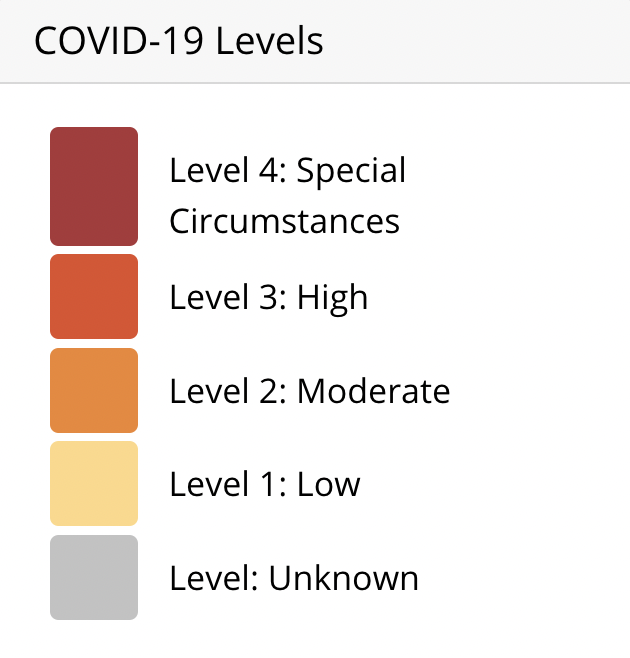COVID-19 Travel – What You Should Know
With mandatory lockdowns and quarantine procedures implemented since the wake of 2020, global travel has been completely transformed as the pandemic exacerbated in-border and foreign travel. Airline companies and global tourism sectors have been particularly hit by the spread of the virus, as mass paranoia as well as governmental procedures made travel nearly impossible. Now, however, as vaccinations are being rolled out at rapid speeds and countries are adapting to the new conditions of the world, travel restrictions are being relaxed and new procedures are being implemented in order to promote safe COVID-19 travel.
COVID-19 Levels
Each country is dealing with its own unique set of circumstances with regards to the pandemic’s impact on its economy, and it is thus very important to recognize such circumstances and relevant governmental practices when travelling to a particular country.
As such, the CDC has come up with 5 levels of COVID-19 severity to assign to each country, as explained below:
Level: Unknown
- This relates to an unknown level of COVID-19. It is recommended to avoid travel to this destination if you are not up-to-date with all necessary COVID-19 vaccinations or if you have a weakened immune system, and it is also important to do specific research on the destination country’s situation before booking a flight!
- Level Unknown countries include: Armenia, Mongolia, Haiti, Hungary, Iran, Comoros, Bhutan, Belarus, Cambodia, Ukraine, Venezuela, and more.
Level 1: Low
- This denotes a low level of COVID-19 in the country, and so it is considered a relatively safe zone with regards to COVID-19 travel. Simply make sure you are completely vaccinated before visiting Level 1 countries, just to be safe.
- Level 1 countries include: Liberia, Romania, Guinea, Cuba, Egypt, Indonesia, Bangladesh, Cameroon, China, India, Nepal, and more.
Level 2: Moderate
- This denotes a moderate level of COVID-19 in the destination country. It is recommended to be fully vaccinated before visiting, and in the case that you have a weakened immune system or a higher risk of becoming sick from contracting the virus, you should talk to a health practitioner about necessary precautions and procedures before, during, and after travel.
- Level 2 countries include: Gabon, Lesotho, Mauritania, South Africa, Jordan, Russia, Saudi Arabia, Kenya, Oman, Zambia, and some more.
Level 3: High
- This indicates a high level of COVID-19, and travel is not recommended to this destination if you are not fully vaccinated. If you have a weakened immune system or a higher risk of becoming sick from contracting the virus, discuss the risks of travel with a health practitioner, and preferably delay any travel to this destination.
- Level 3 countries include: Thailand, Colombia, Macedonia, Paraguay, Lebanon, Mexico, UAE, Taiwan, Bahrain, Australia, Canada, Chile, and many more.
Level 4: Special Circumstances
- This destination should be avoided due to its extremely high level of COVID-19 cases. Do not travel to this country unless necessary, in which case make sure to be fully vaccinated before visiting.
- No country is currently under the Level 4 label.
Each of these levels have unique sets of requirements a country must have to be labelled with one of them, and the CDC released an article providing a breakdown of each.
COVID-19 travel is an experience unique to every country, as each country’s rules and regulations will depend on the country’s within-border state as well as the state of the source country from which visitors come.
COVID-19 Travel Bans
Some countries have completely banned entry except for special circumstances, such as for returning citizens. For instance, for travellers from the U.S., the following countries have implemented COVID-19 travel bans:
- Bhutan
- Libya
- Taiwan
- Cameroon
- China
- Syria
- Samoa
- Turkmenistan
- Falkland Islands, and 17 others.

Questions to ask yourself before any sort of COVID-19 Travel
- Have you been fully vaccinated?
- If your answer to this is yes, then you are almost good to go for travel! Otherwise, consider getting vaccinated before travelling anywhere, regardless of a country’s level of COVID-19 risk.
- Do you have a weakened immune system, or are you at higher risk of severe illness from COVID-19?
- If your answer to this question is yes, consider delaying your travel or opting for a low-risk destination. You should also discuss the risks of travel as well as necessary precautions to take with a health practitioner.
- Do you live with someone with a weakened immune system are higher susceptibility to illness?
- You must consider the risk of bringing back COVID-19 to your household upon returning. If your answer to this question is yes, consider delaying your travel or opting for a low-risk destination.
- Does your destination country have any COVID-19 travel restrictions to watch out for?
- For instance, some countries have online portals to log into in order to keep track of your personal COVID-19 status (i.e. Canada has ArriveCan, which needs to be filled out before you travel)
Major Destination Information – COVID-19 Travel? (as of August 9, 2022)
China
- All international students studying at institutions in China will be allowed to enter the country from abroad – typical screening procedures for COVID-19 travel may be applicable.
- All travellers to China are screened upon arrival and must be quarantined for 14 days, at a government-selected facility or hotel at their own expense.
- A negative COVID-19 test is required prior to entry.
Japan
- There are certain countries with a COVID-19 travel entry ban into Japan – any foreign national who has been in those countries within 14 days of an entry date will not be allowed to enter. These countries are:
- Haiti, Jamaica, Saint Vincent and the Grenadines, and Saint Lucia
- Bosnia and Herzegovina, Bulgaria, Kyrgyz, Moldova
- Afghanistan and Iraq
- Algeria, Angola, Cameroon, Central Africa, Cote d’lvoire, Democratic Republic of the Congo, Djibouti, Equatorial Guinea, Eswatini, Ethiopia, Gabon, Gambia, Ghana, Guinea, Guinea-Bissau, Kenya, Liberia, Libya, Madagascar, Malawi, Mauritania, Namibia, Nigeria, Republic of Congo, Senegal, Sierra Leone, Somalia, South Sudan, Sudan, Zambia, and Zimbabwe
- There’s limited entry for U.S. citizens. Pre-travel testing within 72 hours is still required, and occasionally, travellers may be subject to on-arrival testing and quarantine.
France
- The health check system at borders has been lifted.
- Travellers no longer need to submit a sworn declaration of not being infected. The COVID-19 certificate is no longer needed, either.
Thailand
- The Thailand Pass is no longer needed for incoming nationals.
- Fully vaccinated individuals must submit proof (certificate of vaccination).
- Unvaccinated individuals must present a negative PCR test no older than 72 hours prior to the flight date.
USA
- No PCR is required prior to travel; however, you must present proof of vaccination before boarding a flight to the U.S., if you are a non-citizen.
Touch-less COVID-19 travel – the new way to navigate air transport during the pandemic
A surefire way to further the spread of COVID-19 is unsanitary surfaces, as well as the sharing of contact material and the exchange of physical documents in airports before and after flights. We thus propose a new way to go about such procedures: e-documents and embedded SIMs.
E-documents
As of late, QR code scanning to verify one’s vaccination status is becoming increasingly used, and airports may be allowing passengers to present their documents either via scanning at electronic booths (Canadian and Italian airports employ this, for instance!) or presenting documents by electronic submission before arriving at the airport. Not only does this make airport procedures much more efficient and rapid, it minimizes the physical exchange of documents between passengers and airport workers and subsequently minimizes the potential spread of the virus.

eSIMs
It is inevitable to need to stay connected throughout our travels, especially in foreign countries in which we rely on virtual mapping and communication services to get around. Physical SIMs serve this function normally, but given the current state of the world, it might not be the smartest option to opt for during COVID-19 travel. eSIMs, or embedded SIMs, serve all the same purposes as physical SIMs, except they are completely virtual! You would simply purchase one online from a phone carrier in the destination country, and after receiving a QR code to scan, you could easily install a connection on your phone without having interacted with an actual vendor. To learn more about eSIMs, read our article here!












